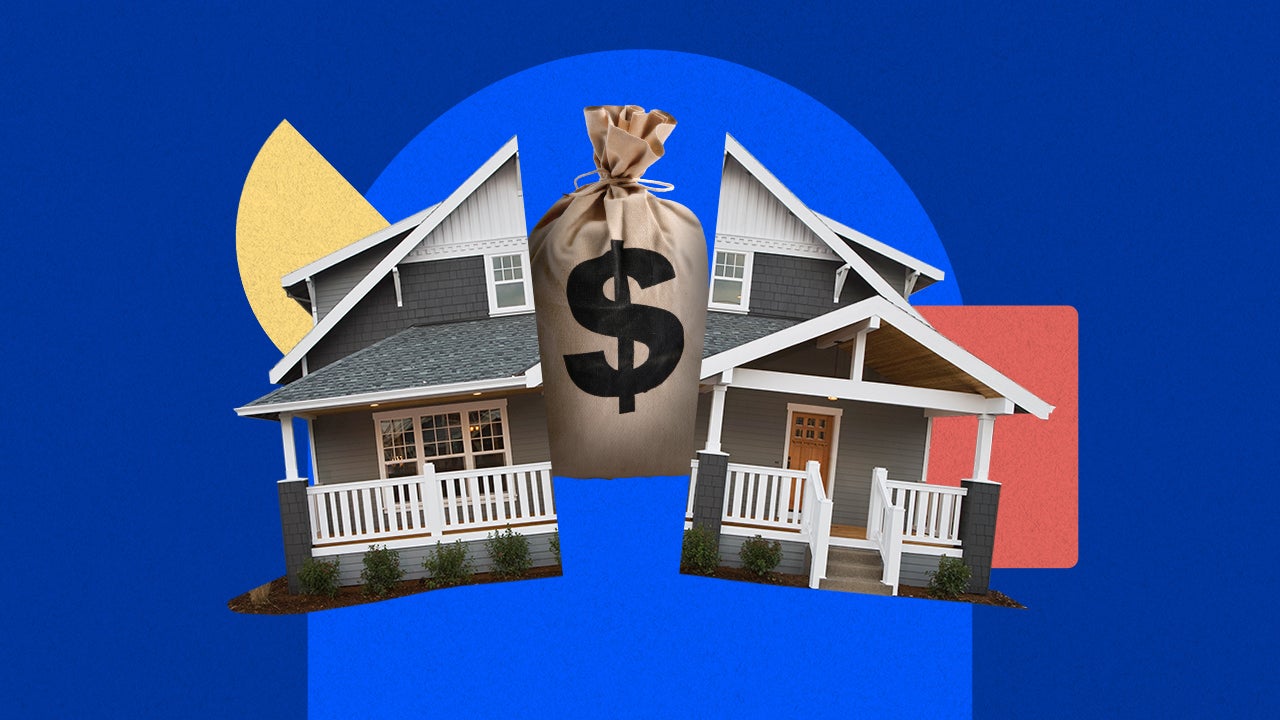54% of aspiring homeowners don’t earn enough to afford the purchase. Should you pool resources with a friend?




Key takeaways
- High home prices combined with high mortgage interest rates make today’s market challenging for aspiring homeowners, especially young or first-time buyers.
- Buying a home with a friend can help address affordability concerns and help you afford more home, sooner.
- But there are serious implications to tying your finances to someone else — any change in their financial stability will also affect yours.
For many hopeful homebuyers, sole ownership is prohibitively expensive. Nearly three-quarters (73 percent) of people who do not currently own a home cite affordability — such as prices being too high or income being too low — as a hurdle standing in the way of their purchase, according to a 2023 Bankrate financial security survey.
In a housing market where prices keep going up and mortgage rates remain stubbornly high, it’s no surprise. “Many aspiring homeowners say the cost of living is too high and their incomes are not high enough to buy a home,” says Greg McBride, Bankrate’s chief financial analyst.
One interesting alternative route to homeownership has been gaining steam recently: pooling your resources with others, so that you can collectively afford more. If you’re considering buying a house with a friend, here’s everything you’ll need to know.
Can you buy a house with a friend?
More than half (54 percent) of aspiring homeowners say their income isn’t high enough to afford a down payment and closing costs on a home, and 51 percent say the cost of living is too high, according to Bankrate’s February 2024 down payment survey.
However, while most people buy alone or with a spouse/partner, it’s absolutely possible to buy a house with a friend, or even a group of friends, to ease that affordability challenge. In fact, research from Zillow shows that “co-buying” was common in 2023: 14 percent of buyers co-bought a home with a friend, while 12 percent co-bought with a relative other than their spouse or partner.
How many people can be on a single mortgage?
Co-borrower vs. co-signer
It’s important to be aware of the distinction between these two mortgage terms. With a co-borrower, you’re actually buying the house together — a co-borrower will have equal ownership of the home and equal duties of paying back the loan. A co-signer, however, does not have any ownership stake in the property. Instead, the co-signer adds their name to help a lender feel more confident about approving the loan.
Things to consider before buying a house with friends
While combining resources with a friend might make your pathway to homeownership easier, keep in mind that it can also create loads of complexities and potential headaches. Younger generations in particular might be saddled with more affordability issues, as evidenced by a 2023 Bankrate study (below), so millennial (ages 28-43) and Gen Z (ages 18-27) buyers should take extra care.
Before you buddy up with someone and jump into one of the most consequential financial decisions you will ever make, there are several crucial implications to consider.
Relationship
How close are you with this friend? How well do you know each other, how much do you trust each other, do you have a solid understanding of their approach to life and money? The same goes for a family member — just because you are related does not necessarily mean you are financially compatible.
You are entering into a legally binding contract together that will have a significant impact on both of your finances and credit. Failing to keep up with a mortgage can have very serious repercussions. Make sure you feel confident that you are both on the same page in terms of the commitment you’re making.
Property type, location and price
Before you begin shopping for a home, make sure you’re in agreement on what type of property you want and which neighborhoods to look in. Will the home need multiple primary bedrooms and bathrooms, dedicated parking spaces, pet accommodations? The more you can decide on in advance, the easier your search will be.
Getting preapproved for a mortgage will give you a good idea of how much a lender would be willing to loan you (be sure they understand your co-buying agreement when you apply). Bankrate’s affordability calculator can also help provide a sense of how much house you can afford.
Ownership terms
“Buying a home with a friend becomes a business arrangement,” McBride says, “and it has to be treated that way.” To avoid future problems with that arrangement — especially if one friend eventually wants to sell or gets married, for example — it’s smart to be proactive. Establish what type of ownership stake you plan to have in the property long before you sign on the dotted line.
Buying a home with a friend becomes a business arrangement, and it has to be treated that way.— Greg McBride, Bankrate Chief Financial Analyst
Joint tenancy, which allows multiple equal stakes in a property, is a common arrangement for married couples and can also work for friends who intend to co-own their home. Tenancy in common is another type of ownership setup where co-owners can divide stakes in the property (25 percent and 75 percent, for example, or one-third each for three people). Regardless of what ownership arrangement you choose, you will want a written agreement drawn up.
Finances
Finally, a frank discussion of finances is in order before you get the process rolling. Consider both of your income, credit scores and debt-to-income ratios, and be upfront and honest about everything. It may seem obvious, but be sure that your co-buyer has stable finances — you are making a big investment together, so in a sense, you are investing in each other. Any problems could potentially impact both of your credit scores.
In a sense, you are investing in each other.
“You’re combining multiple different incomes, credit scores and debts,” says Mike Opyd, president/owner of RE/MAX Next in Chicago. “If someone has poor credit or no consistent income, it can be a real challenge.”
Pros and cons of co-ownership

Pros
- Multiple incomes mean being able to afford more and make a bigger down payment.
- You can split any ongoing homeownership costs with your co-buyer.
- Co-buying gives you a chance to begin building equity at a younger age.

Cons
- Owning a home together can put additional stress on your relationship.
- Your finances are inextricably linked — if one of you loses your job or runs into difficulties, it impacts both of you.
- You’ll need double the paperwork for everything, once for you and again for your co-buyer.
How to buy a house with a friend
5 steps to buying a house with a friend
- Get preapproved
- Hire pros to help
- Go house-hunting
- Make an offer
- Close
- Get preapproved for a mortgage: The process for buying a house with someone other than a spouse is “pretty much the same as the typical application for a mortgage,” says Opyd. That means that getting preapproved is the first step to take. Gather all your paperwork together carefully — you’ll need every document times two, for both of you — and, as you compare lenders, be sure to explain your co-buying arrangement.
- Hire real estate professionals: “If you’re buying an investment property together, it’s smart to work with an attorney to draw up an agreement before you even start looking at places,” Opyd says. “If you wait to draw up the agreement until after you’re under contract, it can get messy.” In addition to a real estate attorney, you’ll also want a knowledgeable local real estate agent to help you with your search. Local agents know their markets well and can be especially helpful for buyers in unique circumstances (like you), so be candid about your joint budget and needs.
- Go house-hunting: Looking online is useful, but it’s important for co-buyers to visit homes in person, together. Discuss what you like and dislike about each, and be clear about which bedrooms and bathrooms would be claimed by which one of you. Consider whether the home will be a good fit for you both now, as well as in the future.
- Make an offer: Once you find a house you both agree on, work with your agent to make an offer on the home. After your offer is accepted, do not skip a home inspection — this important step in the homebuying process will alert you to any issues with the property or repairs that need to be made. Problems could cost you both, so it’s doubly important to be prepared.
- Close on your new home: Closing is an exciting occasion — this is what makes everything official. You will both sign a lot of paperwork and write a lot of checks, and in the end, you and your friend get the keys to your new home. Remember, though, that your upfront expenses were only the beginning of your shared financial journey. You’ll now be responsible for making mortgage payments, paying for maintenance and upkeep and and regularly investing to keep the property in good condition — together. “After closing,” McBride says, “is when the real commitment begins.”
FAQs
-
It can be — depending on the friend. Two incomes can significantly boost your buying power and get you into homeownership much sooner than if you waited to be ready on your own. However, you need to be extremely careful. You and your friend will be tying your finances together in a way that can impact you both. Securing the right kind of legal agreements in advance of the purchase can keep the business side of things efficient.
-
Two common arrangements for co-ownership include joint tenancy, in which you share ownership equally, and tenancy in common, in which each owner may have a different percentage of ownership. A real estate attorney can advise on what will work best for your situation and draw up the documents needed to make it legal.
-
If you and your friend are purchasing an investment property, you might be thinking about buying via an LLC. This type of ownership can act as a shield from personal liability, but it can also make finding a mortgage loan much more difficult. According to Mike Opyd of RE/MAX Next in Chicago, your options for a lender are going to be very limited if you buy via an LLC. However, he says, many people will wind up creating an LLC and transferring the title to it after the purchase is complete.
Why we ask for feedback Your feedback helps us improve our content and services. It takes less than a minute to complete.
Your responses are anonymous and will only be used for improving our website.
You may also like

Cost to buy a house in Virginia




